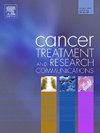Paclitaxel resistance in breast cancer: Current challenges and recent advanced therapeutic strategies
IF 2.4
Q3 Medicine
引用次数: 0
Abstract
Breast cancer (BC) is one of the leading causes of cancer-related deaths among women worldwide. Paclitaxel (PTX), a chemotherapeutic agent derived from the taxane family, is commonly used in treating BC due to its ability to disrupt microtubule dynamics and induce cell death. However, resistance to PTX presents a significant challenge, as it diminishes the drug's effectiveness and can lead to treatment failure. This review explores the mechanisms by which PTX exerts its effects and the various factors contributing to resistance. These factors include genetic mutations that affect tubulin dynamics, the role of non-coding RNAs, molecular pathways involved in chemoresistance, epigenetic changes, post-transcriptional modifications, increased activity of ABC transporters that promote drug efflux, immunosuppressive interactions within the tumor microenvironment, and resistance mediated by autophagy. This review also explores strategies to overcome PTX resistance, including molecular and genetic innovations, combination therapies, and nanotechnology-based approaches. These strategies may improve PTX efficacy and enhance treatment outcomes for BC patients.
乳腺癌紫杉醇耐药:当前的挑战和最新的先进治疗策略
乳腺癌(BC)是全世界妇女癌症相关死亡的主要原因之一。紫杉醇(PTX)是紫杉烷家族的一种化疗药物,由于其破坏微管动力学和诱导细胞死亡的能力,通常用于治疗BC。然而,对PTX的耐药性提出了一个重大挑战,因为它降低了药物的有效性,并可能导致治疗失败。本文综述了PTX的作用机制以及导致耐药的各种因素。这些因素包括影响微管蛋白动力学的基因突变、非编码rna的作用、参与化学耐药的分子途径、表观遗传变化、转录后修饰、促进药物外排的ABC转运蛋白活性增加、肿瘤微环境内免疫抑制相互作用以及自噬介导的耐药。本文还探讨了克服PTX耐药的策略,包括分子和遗传创新、联合治疗和基于纳米技术的方法。这些策略可以提高PTX的疗效,提高BC患者的治疗效果。
本文章由计算机程序翻译,如有差异,请以英文原文为准。
求助全文
约1分钟内获得全文
求助全文
来源期刊

Cancer treatment and research communications
Medicine-Oncology
CiteScore
4.30
自引率
0.00%
发文量
148
审稿时长
56 days
期刊介绍:
Cancer Treatment and Research Communications is an international peer-reviewed publication dedicated to providing comprehensive basic, translational, and clinical oncology research. The journal is devoted to articles on detection, diagnosis, prevention, policy, and treatment of cancer and provides a global forum for the nurturing and development of future generations of oncology scientists. Cancer Treatment and Research Communications publishes comprehensive reviews and original studies describing various aspects of basic through clinical research of all tumor types. The journal also accepts clinical studies in oncology, with an emphasis on prospective early phase clinical trials. Specific areas of interest include basic, translational, and clinical research and mechanistic approaches; cancer biology; molecular carcinogenesis; genetics and genomics; stem cell and developmental biology; immunology; molecular and cellular oncology; systems biology; drug sensitivity and resistance; gene and antisense therapy; pathology, markers, and prognostic indicators; chemoprevention strategies; multimodality therapy; cancer policy; and integration of various approaches. Our mission is to be the premier source of relevant information through promoting excellence in research and facilitating the timely translation of that science to health care and clinical practice.
 求助内容:
求助内容: 应助结果提醒方式:
应助结果提醒方式:


